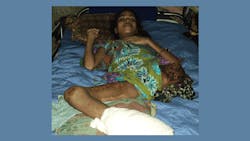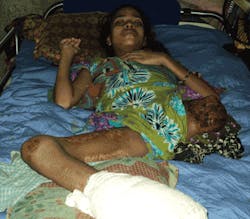Bangladesh: Rebeka: Survival from Death Trap
On April 24, the building collapsed when a generator was started. Rebeka remembers: "My mother and I were working. I was [trying] to finish my hour-based work that was from 8 a.m. to 9 a.m. After a while, my mother came to me and told me that she needed to go home for breakfast. Then I replied, 'Please go alone. I need to finish two more pieces.' Then my mother started to go home and I just started my work again after looking at the clock. All of a sudden, the whole building vibrated and collapsed."
Immediately after the accident, Rebeka started to look for her mother but could not find her. She was pinned under a heavy weight. Seven members from Rebeka's family worked there. Among them, four are missing, one died and two others – including Rebeka – are alive with traumatic, life-altering injuries.
"I was in the dark for 2 days and was not in a position to realize whether it was day or night," Rebeka remembered. "The dead bodies of my colleagues were everywhere. I was very much thirsty. I could not stop bleeding, I passed two days without food and water until suddenly, I noticed that someone was shouting, 'Anyone alive here?'
"Immediately, I tried to draw his attention and shouted, 'Yes, I am alive here.' The rescuer came to me and asked about my condition. First thing, I requested a bottle of water, and the rescuer went back and brought some water for me. But there was no way to reach the water.
"After a while, that person created a path using a drill machine and gave me a water bottle and at that time, he started a rescue operation to save my life. I said, 'My legs are under a big piece of broken building.' Observing the situation, he said, 'I have to cut off your legs to get you out of this trap. Do you agree?'
"At that time, I informed him of my husband's cell number. He went back and contacted my husband. After some time, my husband and elder brother came. They all discussed and decided to pull me out from the debris without cutting my legs off. Then they started to rescue me using drill machine and rod cutter. Almost all tendons of my two legs were damaged while the rescuers were pulling me out. After being rescued, I was sent to Combined Military Hospital (CMH) and then referred to the National Institute of Traumatology and Orthopaedic Rehabilitation (NITOR), Dhaka. I had to lose my two legs for keeping other parts of my body," Rebeka added.
She recalled that all of the garment workers were forced to report to work on the day of the accident even though the local administration had declared the building unsafe. The workers saw the vulnerable condition of the building.
"We demanded to leave for few days but the authority did not approve this," said Rebeka. "The authority rather told us to come tomorrow on time. On that day, the owner of the building – Rana – and the owners of the factories and their representatives forced the workers to enter into the building and to work. They told us, 'No problem, everything is OK.'
"'If you do not go for work, you would not get your salary,' the authorities of factories said. We had no other alternatives but to start work in spite of safety risks," said Rebeka.
Page 2... continued
She continues to receive medical care and is worried about her future livelihood options. Rebeka has not yet been compensated for her injuries as per the labor law. She received 10,000 Bangladeshi taka (BDT) and a sari (a long garment to cover her body) from the government when she first was injured. The garment-factory owners organization BGMEA has paid her monthly salary of 8,500 BDT (approximately $109) with overtime. She also received some financial support and other material support from some voluntary organizations.
Recently, the government gave Rebeka a savings-bank-account certificate of 1 million BDT (approximately $12,850). Rebeka and her family will receive 10,000 BDT per month from the savings account for 5 years.
Rebeka now been admitted to Government Orthopaedic Hospital in Dhaka. She has been receiving treatment there for 2 months. The government is paying all of her medical costs. However, the doctors there are not as skilled and do not have the same resources as the doctors in the beginning of treatment. She will have to remain in the hospital for a long time. She will not return to normal life as it was before the accident. She lost her legs, so now her choice is artificial legs or a wheelchair.
Rebeka has no children and her husband has no regular income. At present, he is physically ill and Rebeka's older brother is taking care of her. Rebeka's husband said it would be better if he had the opportunity for a job that allowed him time to care for his wife.
"I wish to help my wife in her daily activities," said her concerned husband. "How can I go out for a job leaving my wife alone?"
Occupational accidents in RMG factories are a common scenario in Bangladesh, but there is no long-term action to keep workers safe. RMG workers like Rebeka are suffering and we are calling for companies to be humane and save us and save the industry.
But no one hears this call because life is not important as profit gets highest priority.
Repon Chowdhury is the general secretary of the Bangladesh Occupational Safety, Health and Environment Foundation, which works on issues effecting employment, income, economy, environment and livelihood of workers in Bangladesh. OSHE is an umbrella organization for different national and industrial trade unions working together on workplace problems and development issues.

